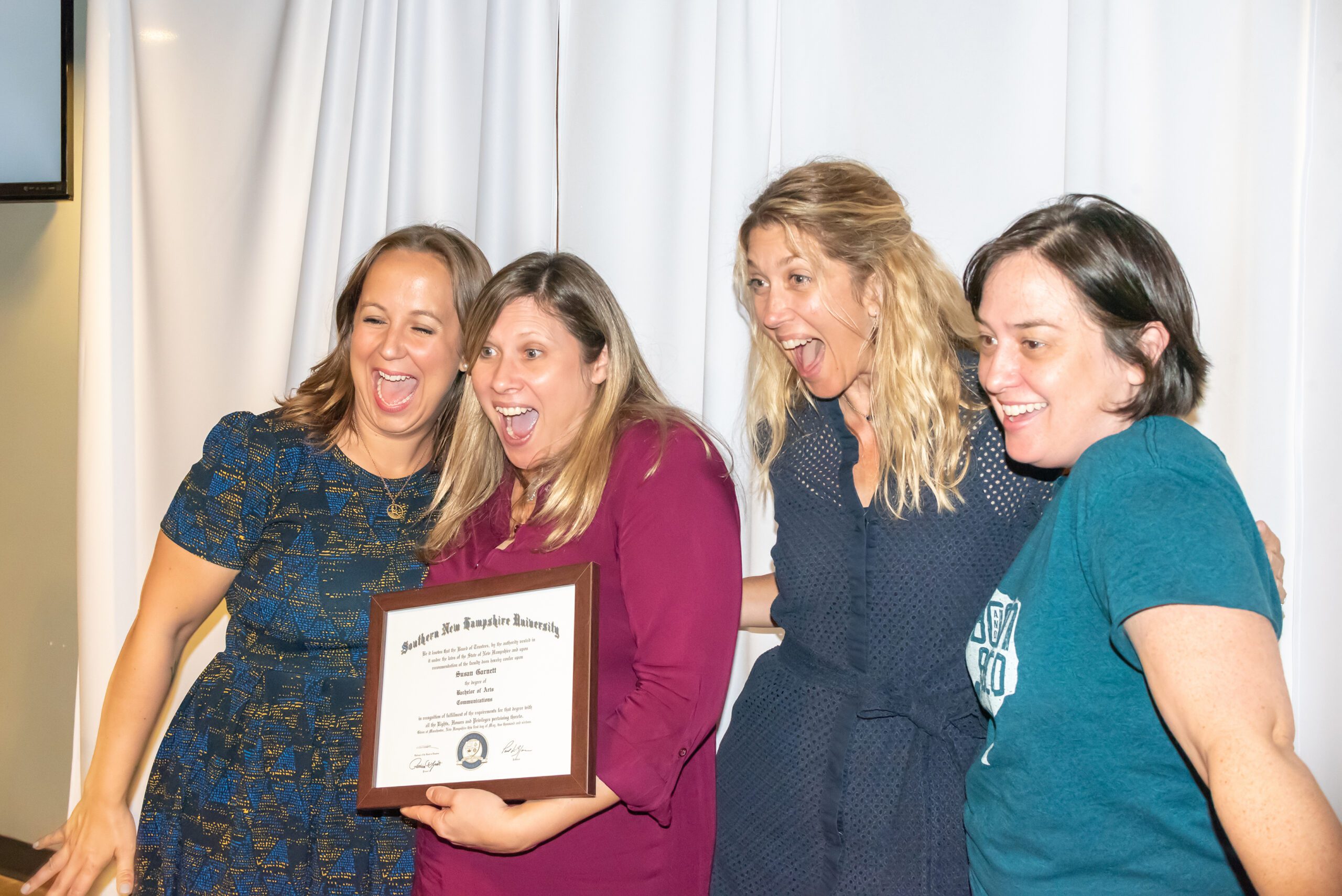United States 
Providing Flexibility and Support for Post-Traditional Students, including Student Parents
Why We Invested: PelotonU

United States 
Why We Invested: PelotonU

When Susan Garnett looked into returning to college at age 37, she found the process overwhelming. With a full-time job in Austin and two school-aged daughters, Garnett struggled with the cost and time commitment required to earn a degree. After learning about a unique program designed for students like her – a working parent and adult learner – she knew she found the perfect solution.
PelotonU is an Austin-based program that partners with multiple competency-based universities – ones that offer credit based on what you know, not seat-time in class – to offer online associate and bachelor’s degrees. An in-person coach guided Garnett through each step and offered academic and emotional support. Garnett earned her Bachelor of Arts in Communications, becoming the first person in her family to earn a four-year degree.
This was before COVID-19 changed everything in higher education for student parents, like Garnett. Students working on postsecondary degrees or credentials have had their world turned upside down. Now it’s a new world of virtual learning and support services, all while navigating homeschooling, social distancing and a very uncertain labor market. It is a difficult time.
Yet, in this time of crisis and ambiguity, it’s uplifting to see organizations, like PelotonU, rise up to support students and families, quickly adapt their program to the new normal and undertake deep reflection to ensure long-term impact and sustainability themselves. PelotonU swiftly responded to this crisis with empathy, efficiency, and foresight.
According to the National Center for Education Statistics, 74% of students in higher education are “post-traditional”: they are either older than 24, working more than 30 hours a week or raising a family. However, these learners’ needs are often misaligned with many postsecondary institutions, many of which are designed for students who are 18-24 years old, live on campus and are financially dependent on their parents.
While some colleges and online universities offer flexibility, enabling students to enroll part-time, they still have fixed academic deadlines that rarely fit the changing schedules of working and parenting adults. As a result, there are still low completion rates. Adult learners – many who have started, stopped and re-enrolled in college multiple times – need a different solution.
In response, hybrid colleges have emerged. These colleges partner with degree providers, such as Southern New Hampshire University, who offer high-quality competency-based education (CBE), which includes online, flexible-pacing coursework, project-based assessments, employer-aligned curriculum and affordable tuition. These programs are designed for a quicker and more efficient learning pace than traditional offerings. However, they can often feel impersonal. This is where PelotonU steps in.
PelotonU’s model offers in-person support, which features coaching for students, a dedicated space to study, and a network of academic resources and social services. Since adapting for COVID-19, PelotonU has seen its core belief – that trusted relationships help people do hard things – proven to be even more true. Their students have slowed down in college given the current environment, yet still had the flexibility to stay enrolled.
Since 2014, PelotonU has served over 250 students in Austin, with 80% persistence for students studying with PelotonU (compared to 33% for part-time students in Texas). PelotonU’s bachelor’s degree earners see an average income increase of over $20,000 (and an average 60% increase). Associate degree earners see an increase of over $10,000 (and an average 38% increase).
Given this deep impact, last year PelotonU decided to help organizations in other communities launch or scale similar hybrid college models to meet the needs of their own adult learner populations, while strengthening partnerships with current practitioners.
Since adapting for COVID-19, PelotonU has seen its core belief – that trusted relationships help people do hard things – proven to be even more true. Their students have slowed down in college given the current environment, yet still had the flexibility to stay enrolled.
Of the 17 million enrolled college students, nearly 4 million are raising children. There are over 45 million students who postsecondary institutions have been unable to retain due to students’ familial and financial obligations. A significant proportion of this group are student parents, who face a critical tradeoff: Remain in school or feed their family. Student parents need early and timely interventions to keep them on the path to postsecondary success, especially during this time.
Over the last few weeks, PelotonU has taken key steps to remain present with students and families, shift its model to adapt to the current environment, and plan for the future.
Addressed students’ immediate needs
Twelve percent of PelotonU’s students lost their jobs within the first two weeks of shelter-in-place in Texas, with more than 40% at risk of job loss. Many other students wished to continue their studies under social distancing restrictions, but didn’t have the equipment at home to do so.
For students in need of equipment or Wi-Fi access, PelotonU delivered laptops and hotspots, or paid for students’ cell phone data plans so they could use their phones as hotspots. For students facing financial insecurity, PelotonU leveraged $20,000 in emergency bridge grants for their families, published an unemployment and career resources video and developed a comprehensive list of outside resources for students.
Monisha Bell, a student parent and one of the first recipients of PelotonU’s emergency bridge grants, epitomizes the resilience of PelotonU students. “No matter what happens, I’m focusing on school first and foremost. I always let things get in the way and use excuses to not get moving in school. Not even this COVID-19 is going to stop me.”
Redesigned its program to ensure continuous support
For many higher education institutions, the priority is adapting programs to a virtual format. PelotonU is taking that a step further, redesigning each part of its model to operate in an online context. As a first priority, PelotonU migrated its coaching program from in-person to remote so that students would not feel any gaps in academic and emotional support, even if their pace of learning slowed.
PelotonU also transitioned the community-building element of its program online and divided the focus into academics and “belonging” – critical social and peer connections. PelotonU students have led the creation of cooking groups, book clubs, parent support networks and weekly YouTube videos that help students navigate these hard times. Support coordinators who used to work in study spaces now do proactive outreach to students most at risk of struggling in school. Beyond this, PelotonU’s nimble staff is running two-week design sprints to integrate feedback from students into new tools and resources. Even to their surprise, the virtual coaching is going really well.
Outline future strategic opportunities
PelotonU is taking the time to think about how its model may change based on where education and students’ lives are headed, from adapting its physical study spaces to improving student feedback loops. Moreover, PelotonU is focused on exchanging learnings with current and aspiring hybrid practitioners, sharing its insights with non-profits now supporting students in online environments for the first time, and advocating for students in public forums. Finally, PelotonU recognizes the growing opportunity to make the case locally and nationally for how its model is uniquely suited for the academic turbulence now in higher education.
At Imaginable Futures, we see economic mobility as a key driver for child and family well-being and success. College completion is a path to achieve economic mobility.
PelotonU’s model inherently serves students that often have the greatest barriers to completion. Eighty-two percent of PelotonU students are first-generation, 88% are students of color, and 42% are parents. PelotonU is one of the few programs that not only consistently tracks its student-parent population, but is also thinking about how to serve their needs more intentionally.
As we move closer to the unknown with multiple social and economic implications of the pandemic, it will be organizations like PelotonU – those that openly communicate (see PelotonU’s 2019 annual report), readily adapt, preserve human connection, and work collaboratively – that pave the way through recovery and towards thriving in the new normal.